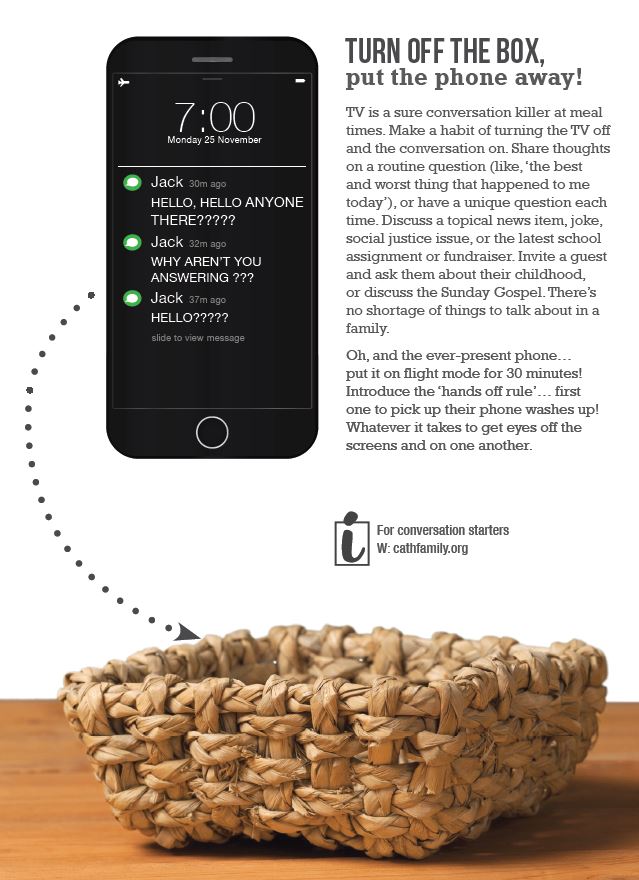Our daily Bread

How sharing dinner is a ritual at the heart of a family’s life.
Many of our fondest memories from childhood relate to meals we have enjoyed with our family, such as long Christmas lunches, the weekly roast, or fish and chips on a Friday night. The humble family meal is a powerful daily ritual that nurtures every member.
More than just a feed
Breaking bread together is a way to build and deepen relationships in all areas of life. Christ’s last moments with his disciples were spent over a meal; that was no accident.
Likewise in our homes a family meal is more than just a feed after a busy day! We eat together not just to nourish our bodies, but our relationships too.
A family meal doesn’t have to be elaborate or Instagram-worthy. In fact, it’s not about the food! It’s an opportunity to say: I love you, we belong, let’s eat!
We ‘feed’ each other by spending time together, sharing in the preparation of the meal, eating together, and listening to each other about what’s happened during the day.
With the pace of life, we need to make family meals a priority or they just won’t happen. Not just for families with young children, but for all of us. And not just on special occasions, but on the ordinary days as well.
Without our conscious prioritising, this precious part of our family life can easily be overrun by sports, work, hobbies, study, household chores, TV or computer games.
Eat together, stay together
One study of more than 5,000 Australian families found that those who spend 30 min or more per day in family mealtimes have a 30 percent less risk of parental separation.
The 2015 study looked at a host of other factors that might be connected with the chances of parental separation, but didn’t find any links; only meals together made a difference. However, it wasn’t about the food, it was about the time spent together. How did they know that? Because they found that having the TV on at meal times removed the positive association between family meal times and family stability.
Dinner with a side of happier, healthier kids
A 2012 Canadian study published in the Journal of Marriage and Family showed that in general, family meals seemed to create a space for parents to promote the healthy development of children.
“Family meals comprise both ritual (symbolic) and routine (activity) elements, each of which may be instruments to a child’s positive development outcomes”, the researchers noted. “Routine and ritual practices can act as markers for healthy family functioning; respectively, they are indicative of greater organisation and a greater sense of belonging and closeness for children.”
Take the boring out of weeknight dinners
» Go fancy. Use candles, flowers or greenery from the garden, the ‘good’ crockery and silverware. Write place cards and fold serviettes and let the kids drink their milk from a wine glass!
» Change of scene. Thow a picnic blanket in the back yard or on the balcony for a picnic dinner at home, or take it to a nearby park or beach.
» Back to front. Don’t worry about rationing your appetite for once – eat dessert first!
» Colour code. Let colour inspire the choice of food and table decorations, e.g. green for St Patrick’s day, red for Pentecost.
» Loungeroom camping. When it’s cold outside, light the fire or some candles for a camp dinner atmosphere.
» Turn it up! Keep the fun vibe going at clean-up time by playing some high-energy music. They’ll be more inclined to stay and help (happily).
Pope Francis on family meals
“The sharing of meals — and thus, in addition to food, also of affection, of stories, of events — is a fundamental human experience.
The Lord Jesus gladly taught at the table, and sometimes portrayed the Kingdom of God as a festive banquet. …
In this perspective we can rightly say that the family is ‘at home’ at Mass, precisely because it brings to the Eucharist its own experience of conviviality and opens it up…to God’s love for the world.”
Pope Francis | Wednesday Audience, November 11, 2015
Blessed Mealtimes
It’s 7pm. Everyone is miraculously at home – and hungry! – at the same time. You’ve even managed to get the phones and other devices off the table. Before racing through dinner to get on to the next thing, stop for a moment. Bring your attention to what is on the table, and around it.
The food – A simple gift from God that gives us life and energy and is a sign of God’s love for us.
Our family – God has given us to each other to reveal Jesus’ love for us, and to grow our own love.
A simple grace before meals inspire gratitude for the good things and people in our lives, and this moment of sharing family time and food!
Prayer
Dear Lord,
Everything good
comes from you, including this meal
we are about to share.
We thank you for it.
Bless this food and drink. Bless us
and our time together.
Amen.
This article is an excerpt from FRANKLY – The mindset issue.
FRANKLYmag
https://cathfamily.org/wp-content/uploads/2018/11/franklyMindset-300×300.png
The Mindset Issue
BUY NOWhttps://cathfamily.org/wp-content/uploads/2018/11/franklyHappiness-300×300.png
The Happiness Issue
BUY NOWhttps://cathfamily.org/wp-content/uploads/2018/11/franklyMercy-300×300.png
The Mercy Issue
BUY NOW
FRANKLY is sold in boxes of 50, if you are looking to buy a single copy visit marriagerc.org/shop


